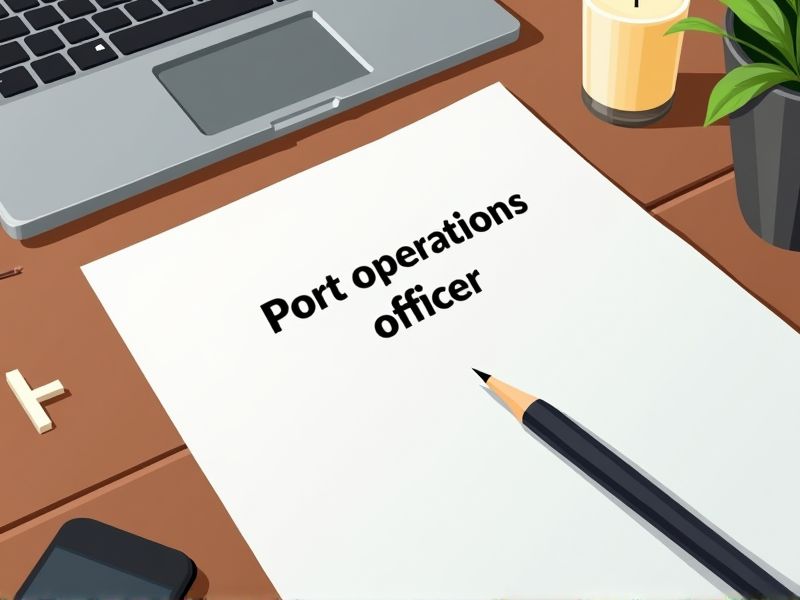
Port operations officers handle complex logistics and ensure smooth operations, making specific certifications essential for efficiency and safety. The certifications provide them with the skills to manage perilous materials, understand maritime laws, and navigate operational challenges. These credentials often enhance an officer's ability to implement advanced technology and improve communication with international partners. Important certifications you may need for a port operations officer include those related to logistics, safety management, and maritime security.
Port Operations Management Certification
Port Operations Management Certification equips officers with specialized knowledge crucial for handling complex port logistics efficiently. Enhanced decision-making skills acquired through certification reduce operational errors and improve safety standards. Certified professionals often drive increased productivity as they implement best practices and streamline processes. The certification also elevates a port officer's career prospects, reflecting a commitment to excellence and proficiency.
STCW Basic Safety Training Certification
STCW Basic Safety Training Certification equips Port operations officers with essential skills in personal safety and social responsibilities, crucial for minimizing workplace accidents. Training in fire prevention and firefighting enhances their ability to respond effectively to emergency situations, safeguarding both personnel and port infrastructure. Proficiency in survival techniques and first aid ensures prompt assistance in maritime accidents, which can occur within busy ports. Certification fosters compliance with international maritime safety standards, ensuring the port's operational reliability and reputation.
ISPS Code Training Certification
The ISPS Code Training Certification equips a Port Operations Officer with essential knowledge of maritime security protocols, enhancing port safety and compliance. Recognizing potential threats and implementing effective security measures reduces the risk of security breaches in port facilities. International maritime regulations require certified officers to ensure consistent security standards across global ports. This certification fosters efficient communication and coordination among port stakeholders in handling security incidents.
International Maritime Dangerous Goods (IMDG) Certification
Port operations officers require International Maritime Dangerous Goods (IMDG) Certification to ensure compliance with global safety regulations, which reduces the risk of accidents when handling hazardous materials. Certification equips officers with essential knowledge to correctly label, document, and segregate dangerous goods, aligning with international shipping standards. This expertise minimizes potential environmental and health hazards, fostering safer working conditions for port personnel. Ports enhance operational efficiency and credibility by employing certified officers, thus attracting more shipping clientele that emphasizes on safety standards.
OSHA Safety and Health Certification
OSHA Safety and Health Certification reduces the risk of workplace accidents, promoting a safer environment for port operations officers who often work in high-risk settings. Certification ensures officers are knowledgeable about handling hazardous materials and equipment, which is crucial for preventing contamination and maintaining operational flow. Proper training through certification can lead to increased efficiency due to fewer disruptions from accidents or violations. Certified officers tend to foster a culture of safety, which can enhance the overall reputation and accountability of the port, leading to potential economic benefits.
HAZMAT Awareness Certification
Port operations officers handle hazardous materials frequently; HAZMAT Awareness Certification equips them with essential safety knowledge. Without this certification, the risk of accidents and environmental harm significantly increases. Regulatory compliance demands that personnel handling such materials are properly trained and certified. Acquiring this certification enhances the officer's ability to respond effectively to hazardous incidents, minimizing potential hazards.
Maritime Security Certification
The International Ship and Port Facility Security (ISPS) Code mandates security measures, influencing port operations officers to obtain Maritime Security Certification to ensure compliance. Threats such as piracy, smuggling, and terrorism require port personnel to be equipped with specialized security skills, which the certification provides. A well-informed port operations officer with certification can effectively respond to security breaches, minimizing risks and disruptions. Stakeholders, including governments and shipping companies, demand certified port operations officers to maintain confidence in security protocols and international trade facilitation.
Environmental Management Systems (EMS) Certification
Port operations involve complex activities with significant environmental impacts; EMS certification helps manage these impacts effectively. By adhering to EMS standards, port operations officers can ensure compliance with environmental regulations, reducing the risk of legal penalties. Certified operations demonstrate a commitment to sustainability, enhancing the port's reputation and stakeholder trust. Improved environmental performance through EMS can result in cost savings, such as reduced waste and energy consumption.
Port Safety and Emergency Response Certification
Port Safety and Emergency Response Certification equips a Port operations officer with crucial skills to manage potential hazards, enhancing overall safety. This certification ensures officers are knowledgeable about regulatory standards, reducing the risk of non-compliance penalties. Trained officers can effectively handle emergencies, minimizing operational disruptions. A certified officer improves stakeholder confidence in the port's capability to maintain safe and efficient operations.
Project Management Professional (PMP) Certification
Attaining Project Management Professional (PMP) Certification equips port operations officers with advanced project management skills, essential for handling complex logistics and large-scale operations efficiently. The certification enhances decision-making capabilities, crucial for optimizing resource allocation and timelines within port activities. It signifies a standardized level of expertise, building trust with stakeholders and clients who rely on the port services. PMP credentials improve career prospects and salary potential, given the high demand for certified professionals in the competitive maritime industry.
Summary
When you, as a Port Operations Officer, acquire relevant certifications, you enhance your professional competency and credibility. Increased proficiency can lead to improved operational efficiency within the port environment. This often results in better coordination, reduced risk of errors, and streamlined processes. Such advancements can position you for career growth and potentially higher compensation.
